In today’s interconnected world, the ability to communicate across multiple languages is more crucial than ever.
Artificial Intelligence (AI) has made significant strides in this area, with models like DeepSeek R1 leading the charge.
But what exactly does DeepSeek R1 offer in terms of multilingual capabilities, and why is it a game-changer in AI applications?
- Introduction to DeepSeek R1’s Multilingual Features
- Technical Architecture Supporting Multilingualism in DeepSeek R1
- Practical Applications of DeepSeek R1’s Multilingual Abilities
- Challenges and Limitations in DeepSeek R1’s Multilingual Performance
- Future Prospects of DeepSeek R1 in Multilingual AI Applications
- DeepSeek R1: Unlocking the Future of Multilingual AI
- DeepSeek R1: Frequently Asked Questions
Introduction to DeepSeek R1’s Multilingual Features
DeepSeek R1 is a cutting-edge AI model built to comprehend and generate human-like text across several languages.
This makes it an essential tool for businesses and developers looking to expand their reach in the global market.
Why is this important?
In our globalized society, businesses and individuals often need to communicate with diverse audiences.
An AI model that can seamlessly operate in multiple languages bridges communication gaps, enhances user experience, and opens doors to new opportunities.

A futuristic representation of DeepSeek R1’s computational power and advanced AI architecture.
Overview of DeepSeek R1
DeepSeek R1 stands out due to its advanced architecture and training methodologies.
It’s designed to handle complex language tasks, ensuring high-quality output regardless of the language.
This makes it a valuable asset for various applications, including:
- Content creation in multiple languages
- Customer support automation
- Real-time multilingual communication
- Cross-border business interactions
Significance of Multilingual Support in AI
Multilingual support in AI is not just a feature—it’s a necessity.
It allows AI systems like DeepSeek R1 to cater to a broader audience, ensuring inclusivity and accessibility.
For businesses, this means engaging more effectively with their potential customers in their native languages, leading to higher satisfaction and conversion rates.
Furthermore, DeepSeek R1 can assist in:
- Accurate translation of texts across languages
- Localization of products and services for different markets
- Understanding cultural nuances for improved communication
- Generating personalized multilingual content
In other words, DeepSeek R1 is not just about language translation—it’s about fostering genuine understanding and building bridges across cultures and languages.
DeepSeek R1 empowers businesses and developers to overcome language barriers, making AI-driven communication seamless and effective.

A high-tech visualization of DeepSeek R1’s multilingual AI architecture, showcasing advanced neural processing.
Technical Architecture Supporting Multilingualism in DeepSeek R1
Understanding the technical foundation of DeepSeek R1 reveals how it adeptly manages multiple languages.
Its architecture is designed to ensure efficient and accurate multilingual processing.

A high-tech visualization of DeepSeek R1’s model architecture, illustrating its sophisticated language processing capabilities.
Model Architecture and Language Processing
The key to DeepSeek R1’s functionality is an MoEMixture of Experts (MoE) is a machine learning model architecture that selects specialized subsets of parameters for different tasks, improving efficiency and performance. backbone with 671 billion parametersIn AI models, parameters are numerical values that influence the model's behavior and learning process..
During any operation, only 37 billion are activated, ensuring the model handles complex language tasks while maintaining high-quality output across multiple languages.
The model’s training involved pretraining on a vast multilingual corpus of 14.8 trillion tokensTokens are the basic units of text that an AI model processes, which can be words, subwords, or characters., primarily in English and Chinese, with a significant emphasis on mathematics and programming.
This extensive training enables DeepSeek R1 to understand and generate text in multiple languages, catering to diverse linguistic contexts.

A high-tech representation of DeepSeek R1’s multilingual training data, showcasing language diversity in AI processing.
Training Data and Language Diversity
DeepSeek R1 is multilingual due to the diverse training it has undergone.
The inclusion of various languages and domains enables the model to:
- Understand different grammatical structures and shades of meaning
- Create translations that are contextually appropriate and accurate
- Adapt to different cultural contexts and terminology used in various regions
This diversity ensures that DeepSeek R1 can effectively process and generate text in multiple languages, making it an asset for solving international communication challenges.
From this perspective, the combination of complex architecture and diverse training enables DeepSeek R1 to perform multilingual tasks effectively, reducing linguistic barriers and enhancing communication among diverse audiences worldwide.
The MoE backbone of DeepSeek R1, activating only 37 billion out of 671 billion parameters, ensures efficiency and accuracy in multilingual AI applications.
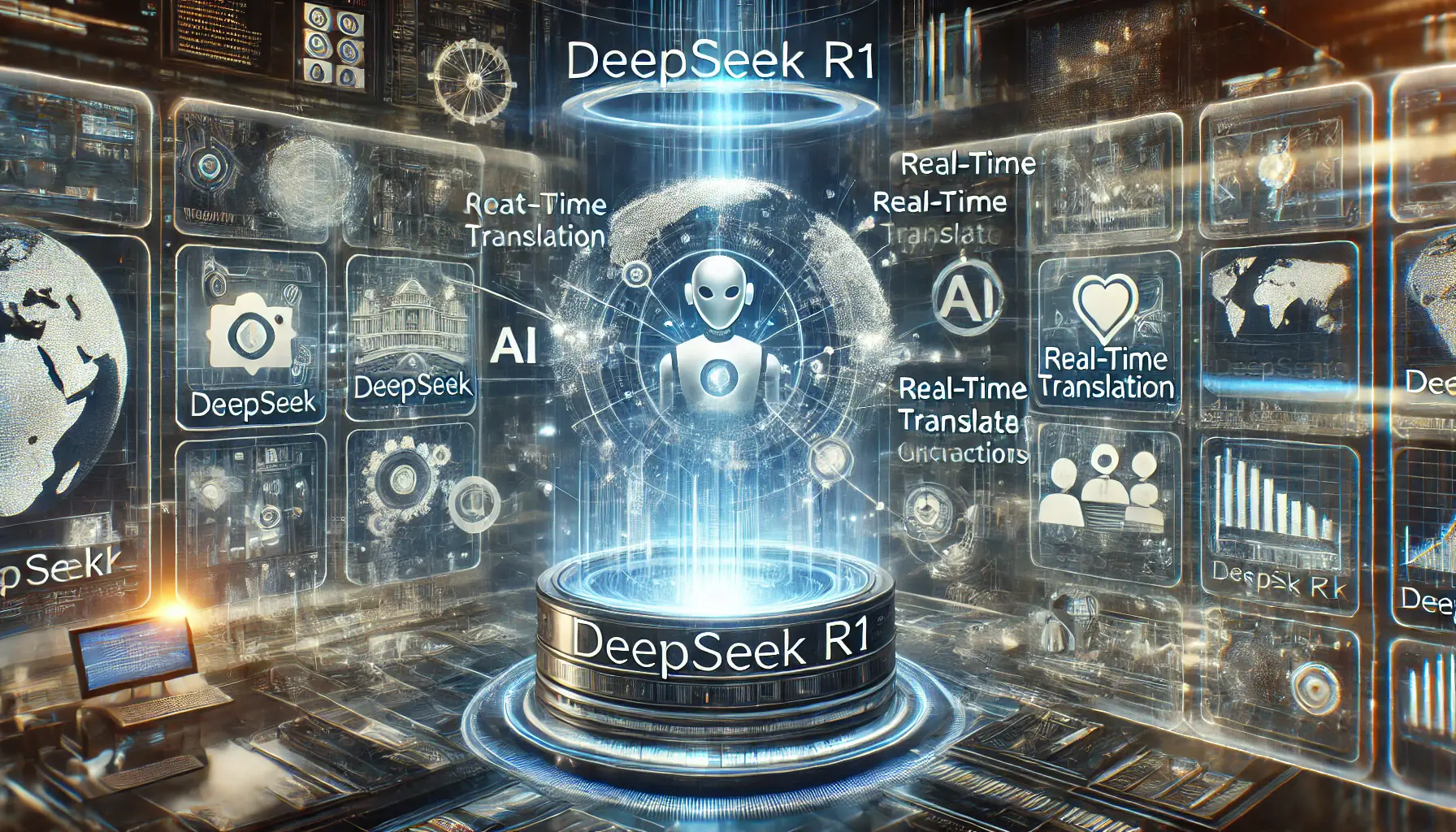
A high-tech visualization of DeepSeek R1’s multilingual capabilities in real-world applications, bridging language barriers.
Practical Applications of DeepSeek R1’s Multilingual Abilities
DeepSeek R1’s advanced multilingual capabilities open a plethora of practical applications across various sectors.
Its proficiency in understanding and generating content in multiple languages makes it a valuable asset for businesses and individuals aiming to operate on a global scale.
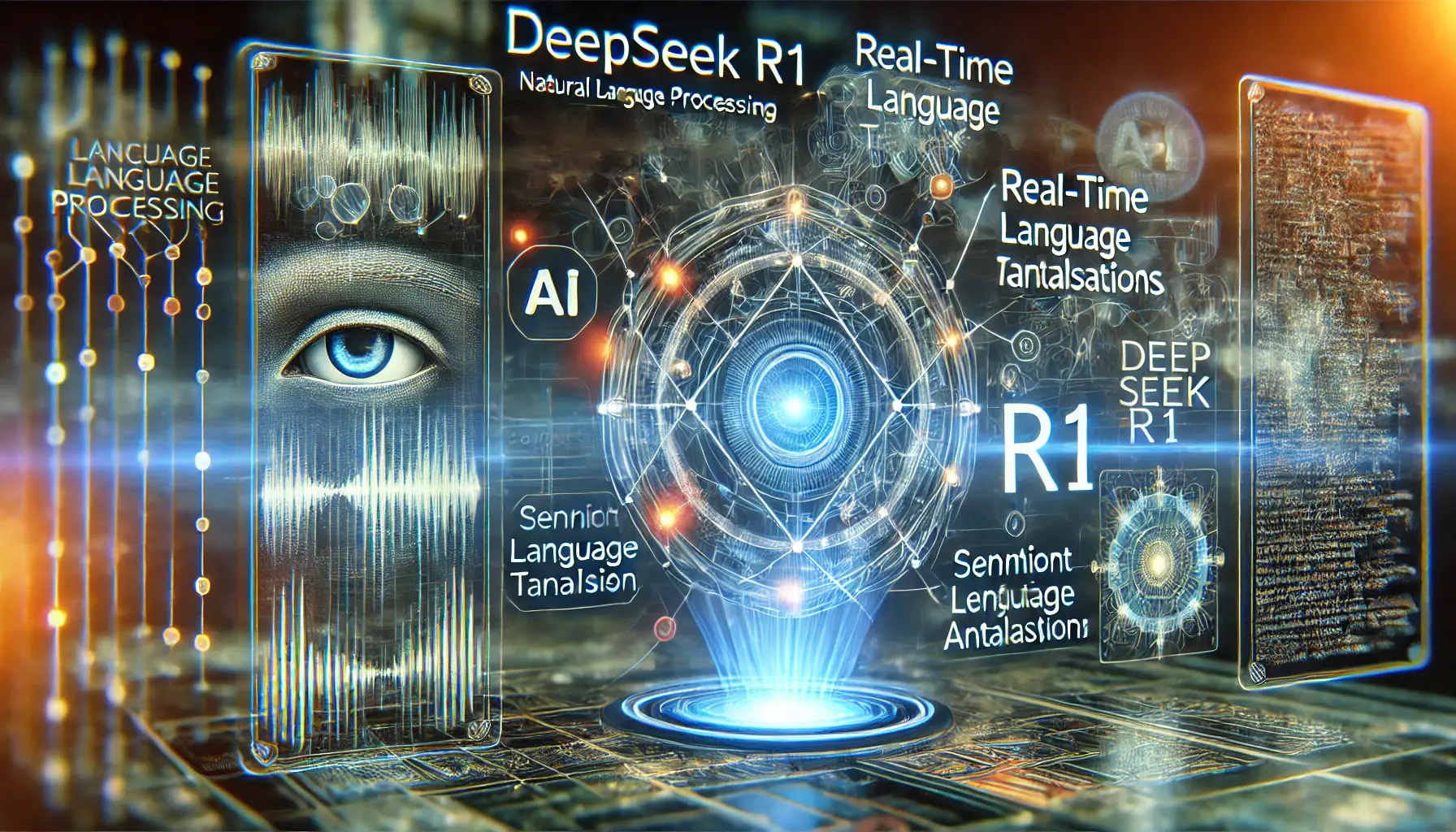
A high-tech visualization of DeepSeek R1’s natural language processing capabilities, enhancing AI-driven communication.
Use Cases in Natural Language Processing
In the realm of Natural Language Processing (NLP), DeepSeek R1 excels in several areas:
- Language Translation: It can accurately translate text between multiple languages while preserving context and nuance, ensuring effective communication.
- Sentiment Analysis: DeepSeek R1 can analyze user sentiment from customer reviews, social media discussions, and various written content across languages, helping businesses understand global perceptions.
- Text Summarization: The model can condense large volumes of multilingual text into concise summaries, making information consumption more efficient across different languages.

A high-tech visualization of AI-driven multilingual business communication, enabling seamless global interactions.
Enhancing Global Business Communications
For businesses operating internationally, DeepSeek R1 offers significant advantages:
- Marketing Content Generation: The model can create culturally tailored marketing materials in multiple languages, ensuring messages resonate with diverse audiences. This capability is crucial for global campaigns aiming to connect authentically with local markets.
- Customer Support: DeepSeek R1 can power multilingual chatbots and automated support systems, allowing businesses to assist customers in their native languages, enhancing customer satisfaction and loyalty.
- Internal Communications: In multinational companies, the model ensures seamless translation of internal documents and communications, making sure all employees, regardless of their language, receive the same information.
By leveraging DeepSeek R1’s multilingual capabilities, organizations can break down language barriers, improve global collaboration, and expand their reach to audiences worldwide.
From NLP applications like sentiment analysisA Natural Language Processing (NLP) technique that identifies and interprets emotions in text. to multilingual customer support, DeepSeek R1 enhances business communication and engagement worldwide.
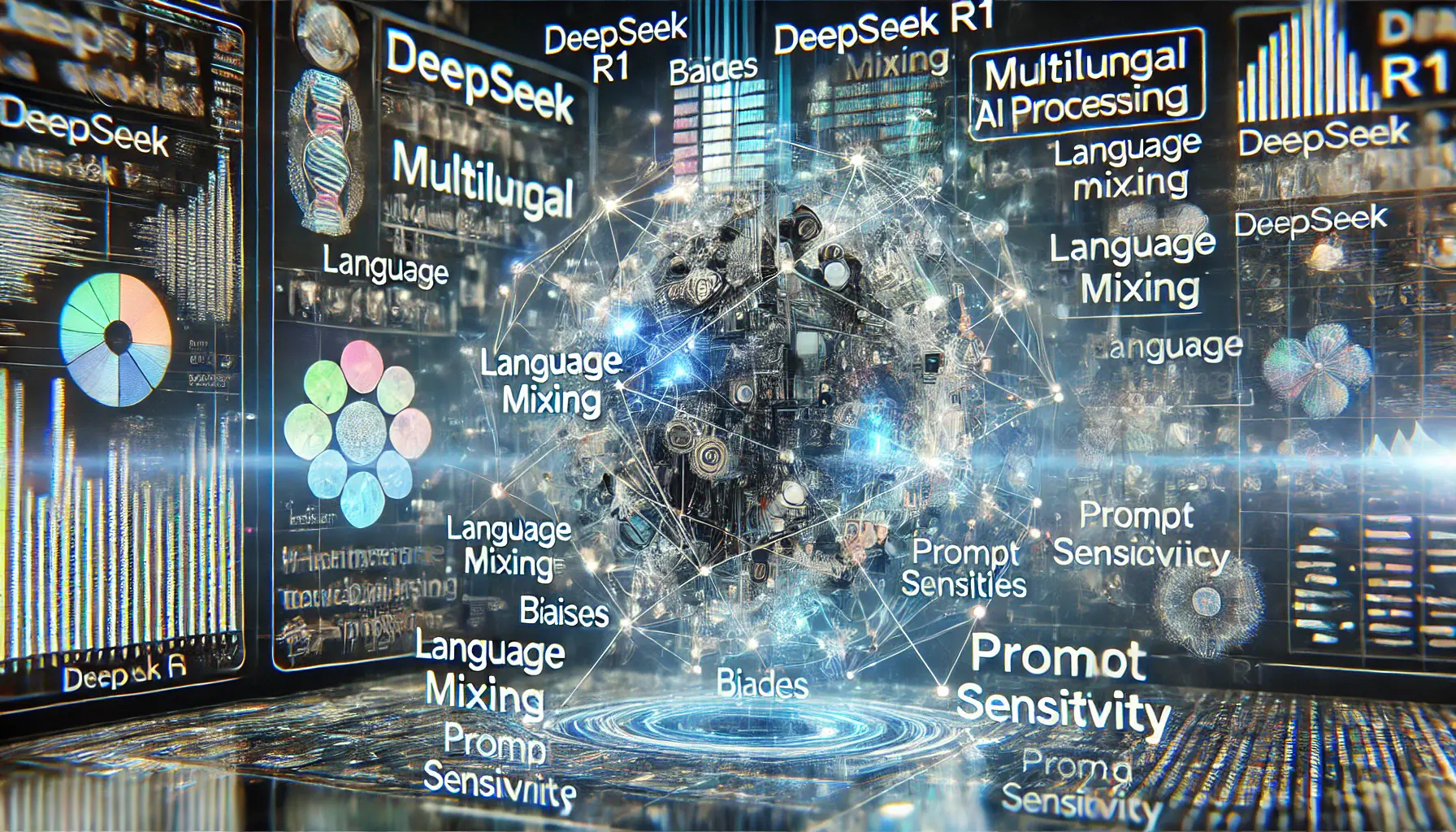
A high-tech visualization of the challenges faced by DeepSeek R1 in multilingual performance, highlighting language mixing and data inaccuracies.
Challenges and Limitations in DeepSeek R1’s Multilingual Performance
While DeepSeek R1 showcases impressive multilingual capabilities, it is not without its challenges and limitations.
Recognizing these areas is crucial for users to effectively navigate and optimize the model’s performance across different languages.

A high-tech visualization of DeepSeek R1’s limitations in language support, highlighting gaps in multilingual processing.
Identified Limitations in Language Support
Despite its advanced design, DeepSeek R1 encounters specific issues:
- Language Mixing: When the input involves multiple languages, the model may blend them within its response, sometimes resulting in outputs that are incoherent or in the wrong language.
- Biases and Censorship: Due to the nature of its training data, DeepSeek R1 may exhibit biases or apply censorship, particularly when handling sensitive topics. This can reduce objectivity and completeness in its responses.
- Prompt Sensitivity: The model’s performance heavily depends on how prompts are structured. It tends to perform better with clear, concise instructions and may struggle with ambiguous or overly complex prompts.

A high-tech visualization of DeepSeek R1 implementing strategies to address multilingual challenges and optimize language processing.
Strategies for Overcoming Multilingual Challenges
To mitigate these limitations and enhance the effectiveness of DeepSeek R1 in multilingual applications, consider the following strategies:
- Effective Prompting: Design clear, unambiguous prompts to minimize the risk of language mixing and ensure the model executes the intended task accurately.
- Post-Processing Review: Implement a review process to identify and correct any biases, censorship, or inaccuracies in the model’s responses, especially in sensitive content.
- Continuous Fine-Tuning: Regularly fine-tune the model using more diverse and representative datasets to improve its language processing capabilities and minimize inherent biases.
- Integration of User Feedback: Actively incorporate user feedback to identify recurring issues and refine the model for more accurate and culturally sensitive applications.
By acknowledging these challenges and proactively implementing these strategies, users can maximize the multilingual capabilities of DeepSeek R1, ensuring more accurate, reliable, and culturally aware applications across diverse languages.
Despite its strengths, DeepSeek R1 may struggle with language mixing, bias, and sensitivity to promptAn input given to an AI model to generate a response or complete a task. phrasing, requiring strategic use for optimal performance.

A high-tech visualization of the future potential of DeepSeek R1 in multilingual AI applications, breaking language barriers globally.
Future Prospects of DeepSeek R1 in Multilingual AI Applications
As the field of artificial intelligence continues to evolve, the future prospects for DeepSeek R1 in multilingual applications are promising.
Ongoing advancements and emerging trends suggest that models like DeepSeek R1 will play a pivotal role in breaking language barriers and fostering global communication.

A high-tech representation of the advancements in multilingual AI, symbolizing progress in AI’s ability to process multiple languages.
Advancements in Multilingual AI
Recent progress in multilingual AI has been remarkable, including the multilingual dataset published by OpenAI, which evaluates 14 languages such as Arabic, German, Swahili, Bengali, and Yoruba.
This effort aims to improve the global reach and accessibility of language models, addressing the urgent industry need for AI systems that can understand and process languages spoken by millions worldwide.
Additionally, Meta has developed SEAMLESSM4T, an AI model capable of instantaneously translating voice-to-voice, text-to-voice, and vice versa in up to 101 languages.
This system surpasses existing models in precision, with improvements ranging from 8% to 23%, marking a significant step toward real-time multilingual communication.
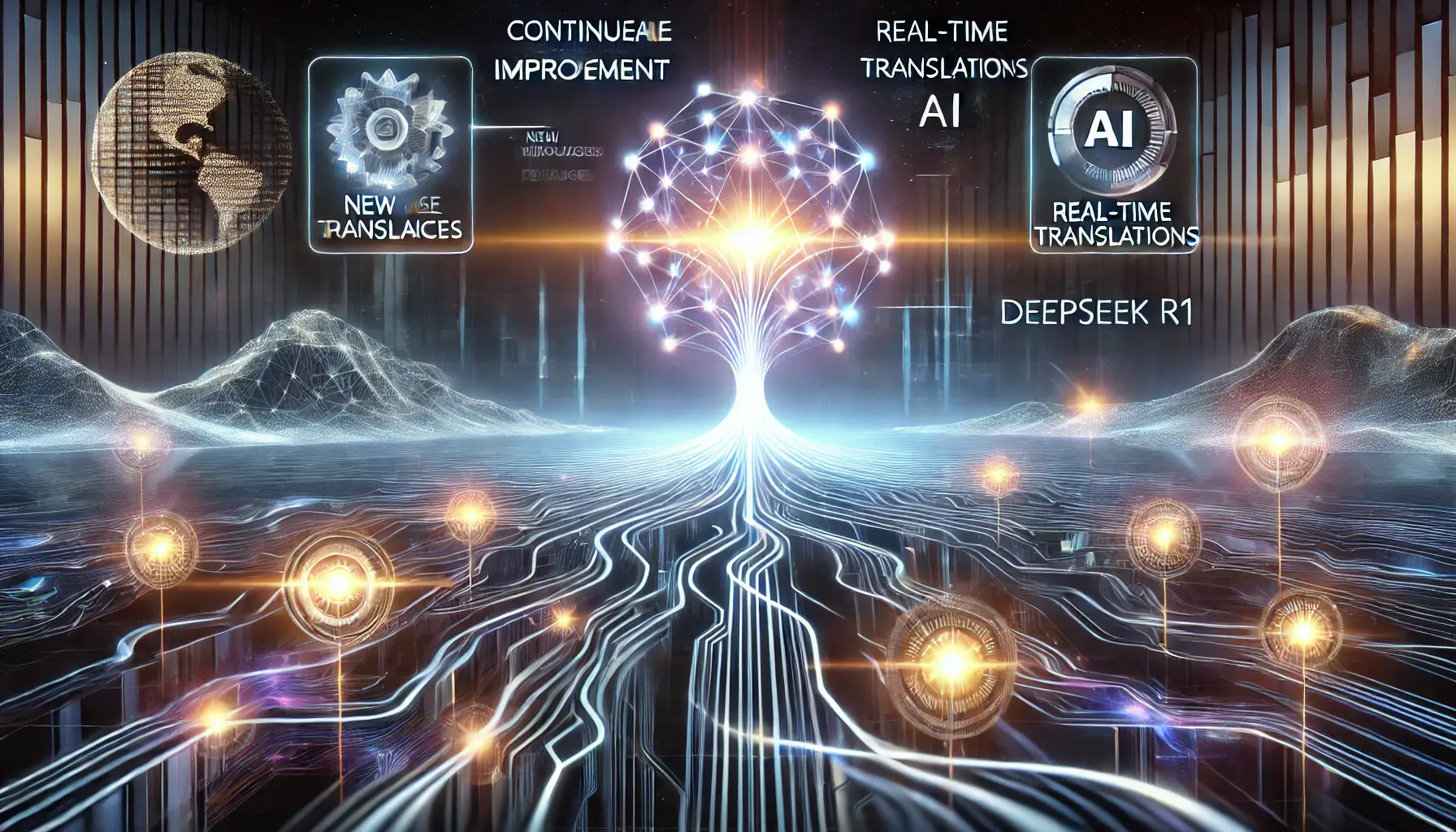
A high-tech visualization of the potential future enhancements for DeepSeek R1, representing advancements in multilingual AI capabilities.
Potential Enhancements for DeepSeek R1
Building upon these advancements, DeepSeek R1 could explore several enhancements to strengthen its multilingual capabilities:
- Incorporating Underrepresented Languages: Expanding the model’s training data to include more underrepresented languages will enhance inclusivity and enable DeepSeek R1 to cater to a broader global audience.
- Real-Time Translation and Interpretation: Developing real-time translation and interpretation capabilities will make DeepSeek R1 invaluable for dynamic communication scenarios, such as international conferences, live broadcasts, and cross-border business interactions.
- Contextual Understanding and Cultural Nuance: Enhancing the model’s ability to grasp cultural nuances and context-specific meanings can improve the accuracy and relevance of translations, resulting in more natural and effective communication.
By pursuing these enhancements, DeepSeek R1 can solidify its position at the forefront of multilingual AI applications, contributing significantly to a more connected and linguistically diverse world.
Expanding support for underrepresented languagesLanguages that have limited resources or training data in AI models, making them less supported compared to widely spoken languages. and integrating real-time AI-driven translation can further enhance DeepSeek R1’s global impact.

A high-tech representation of DeepSeek R1 unlocking the future of multilingual AI with advanced language processing and global collaboration.
DeepSeek R1: Unlocking the Future of Multilingual AI
As artificial intelligence continues to evolve, models like DeepSeek R1 are setting new standards for multilingual capabilities.
From its cutting-edge architecture to its practical applications in global business and natural language processing, DeepSeek R1 is proving to be a transformative force in AI-powered language solutions.

A high-tech visualization of DeepSeek R1’s key multilingual capabilities, including language translation, sentiment analysis, and real-time communication.
Key Takeaways from DeepSeek R1’s Multilingual Capabilities
This review highlights several key aspects in which DeepSeek R1 excels, including its multilingual capabilities, architectural framework, and diverse NLP applications.
Some of its standout features include:
- MoE-Based Architecture: The model’s Mixture of Experts (MoE) design enables DeepSeek R1 to handle text across multiple languages with high accuracy and performance.
- Versatile NLP Capabilities: DeepSeek R1 excels in tasks such as sentiment analysis, text summarization, and language translation, enriching communication across linguistic boundaries.
- Business and Global Impact: The model supports international marketing, customer service automation, and internal corporate communication, helping businesses overcome language barriers efficiently.
- Challenges and Limitations: Language mixing, biases, and sensitivity to prompt variations remain areas for improvement.
- Future Prospects: Expanding support for underrepresented languages, enhancing real-time translation, and refining cultural understanding will be critical for DeepSeek R1’s continued growth.
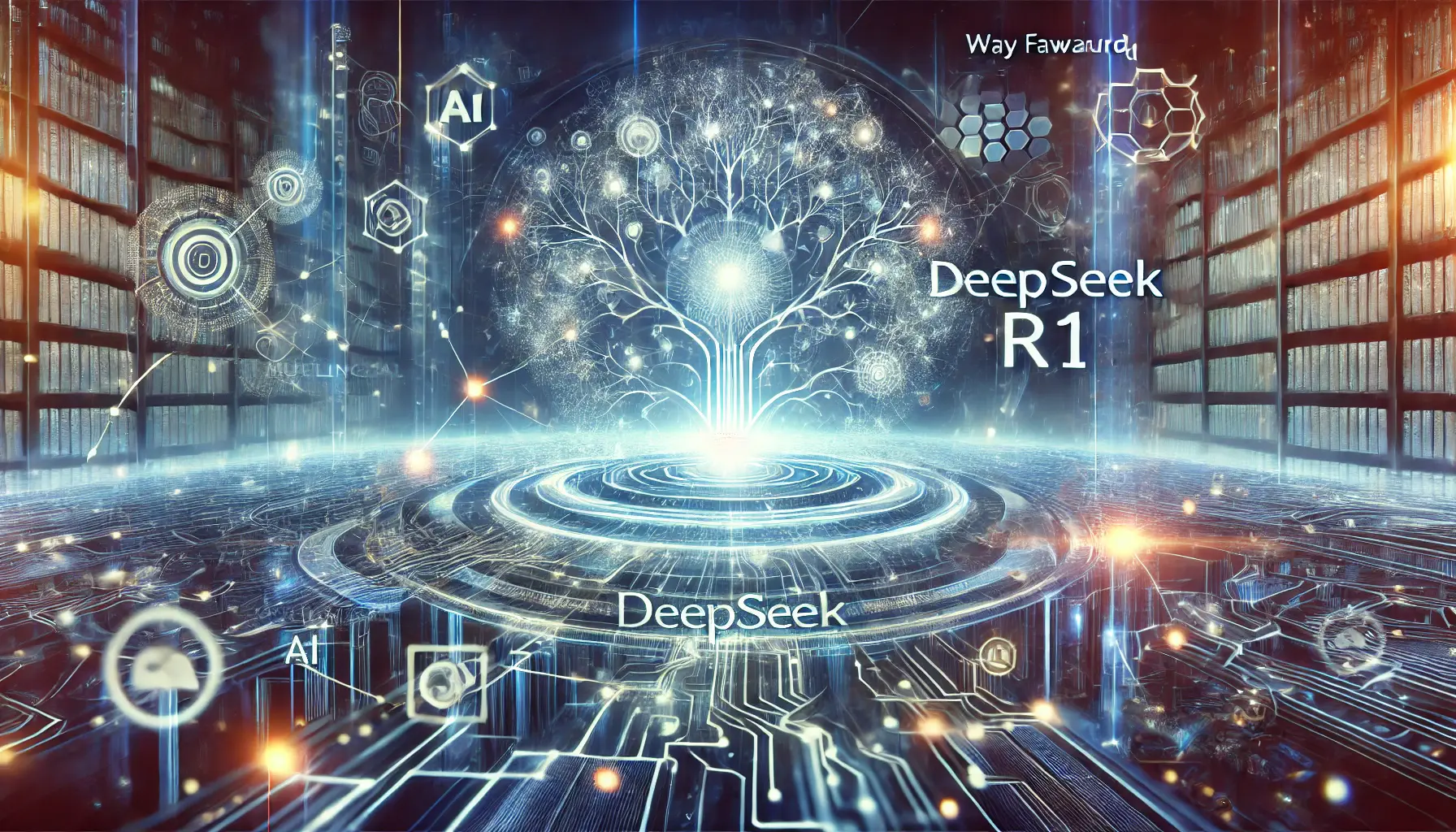
A high-tech visualization symbolizing the continual progress and potential future developments of DeepSeek R1 in multilingual AI.
The Way Forward for DeepSeek R1
In the future, the capabilities of DeepSeek R1 are expected to expand as AI technology advances.
Some potential areas of development include:
- More Language Support: Expanding the model’s coverage to include less widely spoken languages, ensuring broader inclusivity.
- Improved Accuracy: Enhancing contextual understanding for more natural and meaningful translations.
- Seamless Real-Time Integration: Enabling instant multilingual communication solutions for businesses, media, and public services.
By addressing its current limitations and embracing technological advancements, DeepSeek R1 is poised to play a crucial role in shaping the future of AI-driven multilingual communication.

A peaceful and high-tech representation of reflection and final thoughts on the impact of DeepSeek R1 in the field of multilingual AI.
Final Thoughts
In a world where seamless global interaction is increasingly important, the role of AI in breaking language barriers cannot be overstated.
DeepSeek R1 leads this evolution through innovative solutions that redefine how people and businesses connect across languages and cultures.
As it continues to develop, DeepSeek R1 has the potential to revolutionize multilingual AI applications, making communication more accessible and efficient on a global scale.
DeepSeek R1 is revolutionizing AI-powered multilingual communication, bridging linguistic gaps for businesses and individuals worldwide.
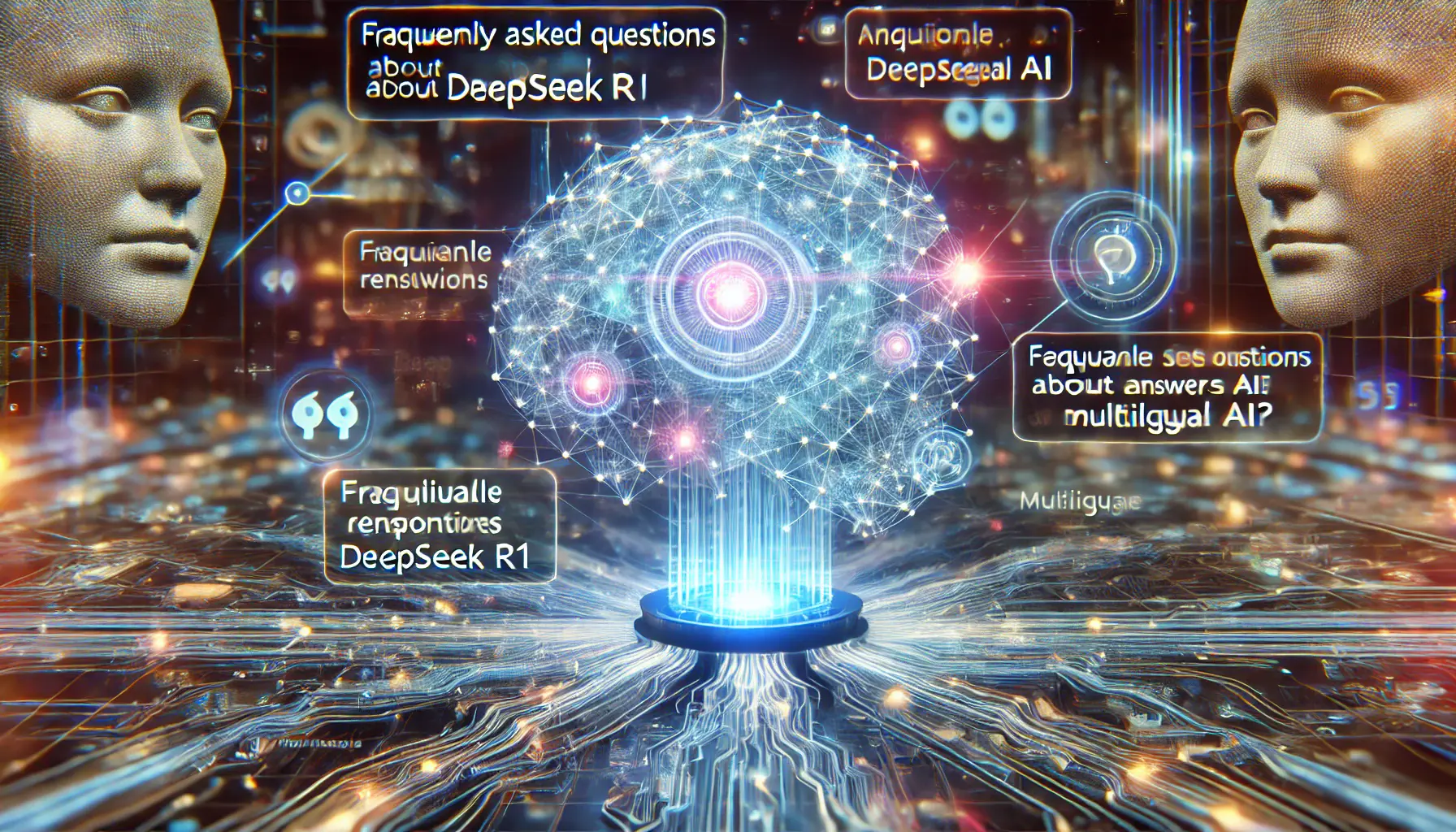
A futuristic visualization of DeepSeek R1 answering frequently asked questions, representing its ability to handle multilingual AI inquiries.
DeepSeek R1: Frequently Asked Questions
DeepSeek R1 is an open-source AI model designed for advanced reasoning, problem-solving, and multilingual capabilities.
It competes with top proprietary AI solutions in terms of performance and versatility.
DeepSeek R1 excels in processing and generating content across various languages.
It ensures context preservation and maintains cultural nuances, making its multilingual outputs more accurate and natural.
Some of the standout features of DeepSeek R1 include logical inference, mathematical problem-solving, coding assistance, and extensive multilingual support for various AI applications.
Yes, DeepSeek R1 is distributed under the MIT license, which allows for commercial use and seamless integration into proprietary software and AI-driven applications.
The model employs a Mixture of Experts (MoE) framework, which activates only relevant parameters per task.
This architecture optimizes computational efficiency while maintaining high performance across different language and reasoning tasks.
Some known limitations of DeepSeek R1 include occasional language mixing, biases in responses, and sensitivity to prompt phrasing, all of which are areas for future improvements.
Developers can integrate DeepSeek R1 using available APIs and resources.
Its open-source nature allows customization for specific use cases, from chatbot applications to multilingual AI-driven automation.
Future advancements for DeepSeek R1 include expanding support for underrepresented languages, improving real-time translationThe instant conversion of spoken or written text from one language to another using AI or software., and refining cultural adaptability to enhance communication and AI interactions.
DeepSeek R1 offers competitive performance in reasoning, coding, and multilingual tasks.
In many cases, it outperforms other open-source models while providing free accessibility and customization opportunities.











